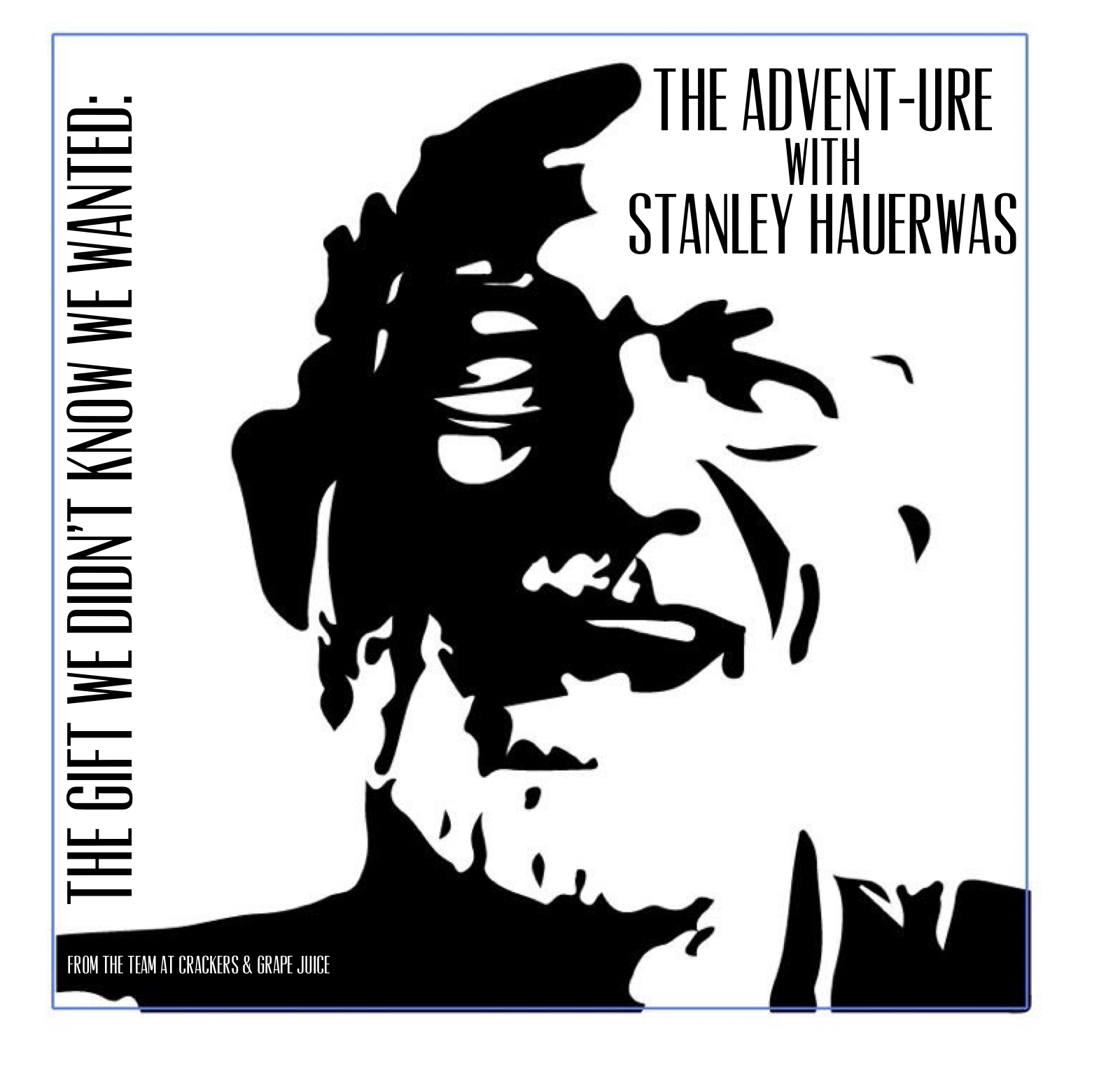
 Back by popular demand (okay, Teer’s Mom asked us to do it again), the Crackers and Grape Juice Advent Devotional Series for 2019 will take the writing and preaching of Stanley Hauerwas as our inspiration. Jason, Teer, Taylor, Johanna, and anyone else we’ve managed to wrangle will help you anticipate the coming again of the King who came to us as a virgin’s baby by nodding to Stan the Man.
Back by popular demand (okay, Teer’s Mom asked us to do it again), the Crackers and Grape Juice Advent Devotional Series for 2019 will take the writing and preaching of Stanley Hauerwas as our inspiration. Jason, Teer, Taylor, Johanna, and anyone else we’ve managed to wrangle will help you anticipate the coming again of the King who came to us as a virgin’s baby by nodding to Stan the Man.
What better way to tie-in into our brand new podcast series, led by Dr. Johanna Hartelius and featuring Stanley himself, which will release next week. It’s called You Are Not Accepted: Engaging Holiness with Hauerwas. Be on the lookout for it.
To kick off our devotional series, here’s Stanley’s sermon for Christ the King Sunday:

Christian Politics
A Sermon for Annandale Methodist Church
Jeremiah 23: 1-6, Colossians 1: 11-20, Luke 23: 33-43
I do not know about you but I have found going through these Donald Trump years exhausting. One of the reasons I have found them exhausting is I have no idea what is going on. Or it may be I think it is obvious what is going on and I do not have the slightest idea what could be done to right the ship. Something seems to have happened to our world and few of us have any idea how to put in back together.
That I am a theologian should make some difference. I have spent a life time reading books that should give me insight into the world in which we find ourselves. For example consider this passage from Bonhoeffer’s Ethics:
“For the tyrannical despiser of humanity, popularity is a sign of the greatest love for humanity. He hides his secret profound distrust of all people behind the stolen words of true community. While he declares himself before the masses to be one of them, he praises himself with repulsive vanity and despises the rights of every individual. He considers the people stupid, and they become stupid, he considers them weak and they become weak, he considers them criminal and they become criminal. His most holy seriousness is frivolous play; his conventional protestations of solicitude for people are bare- faced cynicism. In his deep contempt for humanity, the more he seeks favor of those he despises, the more certainly he arouses the masses to declare him a god. Contempt for humanity and idolization of humanity lie close together. Good people, however, who see through all this, who withdraw in disgust from people and leave them to themselves, and who would rather tend to their own gardens than debase themselves in public life, fall prey to the same temptation to contempt for humanity as do bad people.”
Bonhoeffer wrote that sometime between 194l and 1943 while staying at the Benedictine Abbey Ettal. The secret seminary he directed had been closed by the SS and many of the young men he had trained had been drafted only to be sent to Russia. The passage I just read is obviously Bonhoeffer’s reflections on Hitler and the Nazi takeover of German life. That it is so may mean it is not relevant for our situation because being ruled by a bore is not the equivalent to being ruled by a totalitarian murderous thug. I suspect, however, it is all too relevant to our situation.
I am aware that to begin a sermon with these kind of reflections risks offense. I am visiting preacher. I will say what I have to say and then get out of town. I do not have to pay any price for a sermon, and some may wonder if it is a sermon, that seems far too political. But then I hope to convince you that one of our failures as Christians has been our unwillingness to acknowledge and preach the politics of the cross.
There is also the problem of using a sermon to support or criticize particular political opinions. I obviously am not a big fan of Donald Trump while many of you may well think him as inspired leader for our time. Yet you do not get your view in play because I am in the pulpit and you are in the pew. I win.
Of course we try to avoid acknowledgment of the politics of preaching by underwriting the dogma that religion and politics do not mix. It is assumed my negative view of Trump and those with more positive views should keep those judgments to themselves particularly when they are in church. The only problem with that strategy, which I take to be an attempt to avoid conflict, is the importance of recognizing that few claims are more political than the phrase “religion and politics do not mix.”
That is particularly true when the attempt to keep politics out of the sermon is reinforced by the distinction between the public and the private. Most of us are well schooled by the general presumption that religious convictions are “personal” or “private.” “Private” means it is not incumbent on anyone else to believe what I believe.
That commitment is assumed to take the politics out of religion. Of course as the great historian, Herbert Butterfield, observed some years ago there is usually enough conflict in any church choir to start a war. But that is a politics internal to the church . No one, moreover, takes such a politics seriously. The only problem with the relegation of religious convictions to the private means is that when what we believe is so understood what we believe is seldom thereby thought to be true.
By now I may have tested your patience to the breaking point. You came to hear a sermon and what you have gotten seems more like a lecture about religion and politics that you can well do without. Where is the good news in these problematic generalizations about the relation of the church and politics?
Here is the good news—“There was also an inscription over him, ‘This is the King of the Jews.” Today we celebrate the feast day of Christ the King. It does not get more political than that. The temptation, of course, is to use the language of kingship to make the cross a religious symbol that has no political implications. We are after all Americans. We have never had a king or queen and we have not seemed less for not having monarchs. Was not the War of Independence fought to free Americans from the reach of a king?
We are in the generic sense democrats. Democracies do not have kings. At least they do not have kings that actually rule. We are, moreover, a liberal democracy which is dedicated to the project of making each of us our own tyrant. To be an American means you have to do what you want to do.
Jesus may have been a king but we will not be ruled by a king. We will not be ruled by a king or queen unless we have learned to live as if we are each a monarch of our lives. Yet the desire for freedom without limitation leads, as Bonhoeffer’s analysis presupposes, to servitude.
But this is Christ the King Sunday. If Christ is king it must surely be the case that there is no way to avoid the fact that there was and still is a politics in play that climaxed in his crucifixion. The one who tempted him in the desert was revealed in the crucifixion as the false ruler that tempts us to be more than creatures of God’s good creation.
It is not accidental that the feast day of Christ the King was established by Pius XI in 1925 in his encyclical Quas primas. Pius was so concerned by the murderous reality of WWI he reasoned that the only hope of avoiding future conflicts depended on the public recognition and celebration of “Christ the King.” We become a people incapable of killing one another through the recognition that Jesus is king.
To be sure the politics we experience are democratic. It is also true that there are few examples of the politics of democracy in the Bible. Jesus is nowhere addressed as “Mr. President.” Nor does he seem to be someone who might try to win an election. Take up your cross and follow me does not sound like a winning campaign slogan. I concede that there is one democratic moment in the Gospels—the people choose Barabbas.
I think the problem of articulating the politics of the cross in modernity is not because we are stuck with kingship language in a democratic social order. No, I think the problem is Jesus. In Colossians we are told “He is the image of the invisible God, the firstborn of all creation; for in him all things in heaven and on earth were created, things visible and invisible, whether thrones or dominions or rulers or powers—all things have been created through him and for him.” All things have been created through him—dominions, rulers, or powers.
What are these “powers?” They are givens of God’s good creation that were meant to make our lives possible. But they are fallen giving us the illusion that we are in control of our lives. They were meant to make us cooperative and at peace with one another but they are now used to assert our will over each other.
But they have been exposed and thus redeemed by Christ making it possible for us to live in peace. What does it mean to say they are redeemed? It is to say that the pretention that we are our own creator has been unmasked by the cross. It is to say that if there did not exist a people who worship a crucified king then the world Bonhoeffer describes is never far from reality.
Christ is king. Christians accordingly must be the most political of all God’s creatures but our politics is not “out there.” Our politics is first and foremost here in this bread and wine. Here we become for the world a people of peace in a world of violence. Such a people are made possible by the forgiveness of sins. Forgiveness makes possible the acknowledgment that we can confess the sins of the past without trying to justify what was so wrong nothing can make it right. Slavery was sin.
There can be no question for us who worship a crucified savior—religion and politics do mix. Indeed they do not mix but in fact they are one. There is no politics deeper than the community that is gathered around the cross of Christ. For it is assumed such a community has nothing to lose by acknowledging the truth about our failures to follow this Lord is about truth.
We live in a dangerous world made more dangerous by our unwillingness to obey anyone other than this strange king of the Jews. Do not be afraid but rejoice in the fact that you are a citizen of the kingdom of this crucified king.
